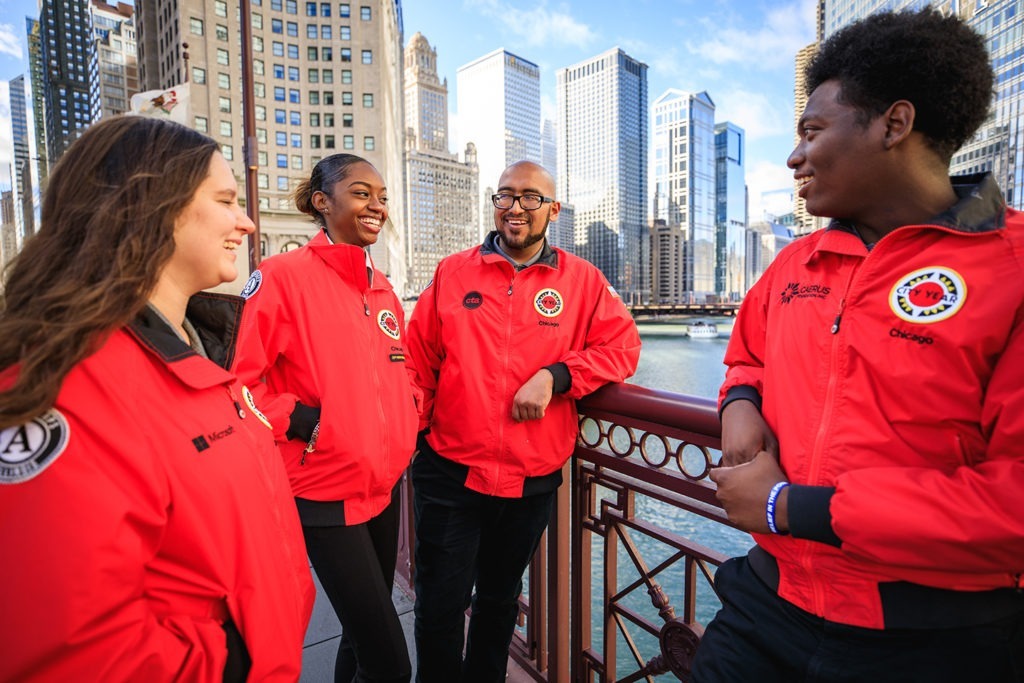Three self-care tips to support your well-being during service

Choosing to serve with City Year is a rewarding, often life-changing decision. City Year AmeriCorps members help students reach their full potential and help them build an ever-expansive sense of self. They work alongside teachers, school administrators and others in the school community, helping to create a network of caring adults for students.
But while helping create an environment where every student can thrive is worthwhile, City Year service can also be challenging.
As student success coaches, corps members work long days and must learn to be flexible, often navigating multifaceted team, school and classroom dynamics. And most importantly, they work closely and tirelessly with students, helping them achieve their personal and academic goals through building positive, trusting relationships with students and providing key academic, social and emotional support.
It’s important to know that practicing self-care throughout your 10 months of service will be an integral part of your experience—because, ultimately, corps members who put their mental health and well-being first are better equipped to extend that same support to their students and school community.
Here are three things to remember regarding service and your mental health and well-being straight from City Year AmeriCorps members:
Lean on your team
City Year AmeriCorps members never serve alone. They collaborate and work in small school-based teams to help the larger school community. Building relationships with your fellow AmeriCorps members is an integral part of service, and your teammates will become one of your main support networks.
“I wouldn’t be able to do this alone because it involves a lot of emotional labor. Being able to go to a teammate and say, ‘This is what I’m going through. How would you handle it?’ makes all the difference,” says Sarai (Los Angeles ’23).
“For example, one time, I inadvertently made a student sad. So, I went to one of my teammates and asked them for advice on the best way to approach and apologize to the student. When other people go through a similar experience, it gives you a sense of community.”
This is hard. Be strong.
It is essential to recognize that systemic inequities affect how many of our communities can access resources and support services. Seeing how these systems actively affect the lives of your students and their families can be heavy—and you should create space to acknowledge this.
“‘Be strong’ doesn’t just mean working 12-hour days or making sure you hit that intervention target each week. ‘Be strong’ also means be gentle with yourself and others because we have a lot of work to do in our education systems, public policies and the hearts and minds of people in this country,” says Aisling O’Brien (Kansas City ’21).
“Be strong” means that when the challenging moments make you want to detach or care a little less–care more. Take service as an opportunity to find joy with your students, build their confidence, be their advocate and amplify their voices as they advocate for themselves.”
Be patient and set boundaries that work for you
Take some time at the start of service to get clear about how you wish to show up as a corps member. This will help you set clear and healthy boundaries for yourself and others, which will ultimately help your emotional well-being. Be kind to yourself and know that boundaries are deeply personal and are not “one size fits all.” You may find they change as you build relationships with students and team members.
“It’s important to create healthy boundaries between you and your students. I set a clear boundary at the beginning of my service because I felt that was the best way to stay “healthy,” says Sarai. “As corps members, we also have lives outside of the classroom, and we all have stuff going, so creating that boundary worked for me.
“I was patient with myself, and my own journey band over time—and after building relationships—I felt more comfortable letting my guard down with my students.”
Interested in learning more about service with City Year?
Related stories
City Year’s innovative teacher pathway program is helping to address two of the biggest challenges facing public education today: teacher...
Read more about City Year Builds Pathways Into Teaching For Diverse Future EducatorsThe City Year Alumni Leadership Awards, presented by Truist, are City Year’s highest alumni recognition. The awards recognize outstanding alums...
Read more about City Year Honors Nonprofit Founder Dustin LaFontHere are four ways we work to support City Year AmeriCorps member wellbeing and mental health during their service year...
Read more about Resources to support the mental health and well-being of our corpsYou may not have heard a whole lot about Buffalo, New York, but it’s the second biggest city in the...
Read more about A Love Letter to Buffalo, New York















